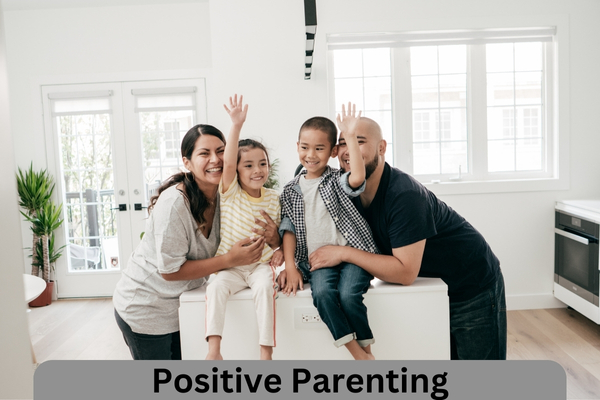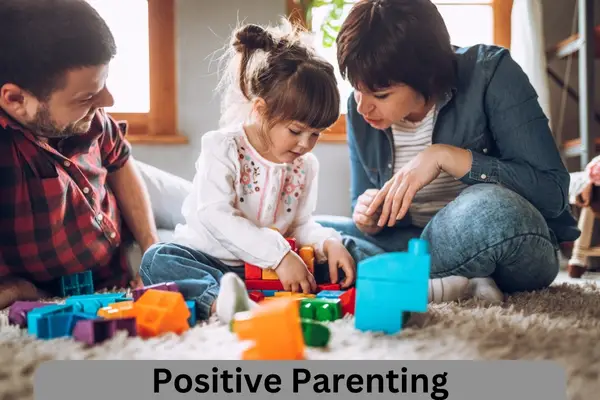Positive Parenting
Parenting is one of the most rewarding yet challenging jobs in the world. As a parent, your top priority is to raise happy, healthy, and confident kids.
However, it’s not always easy to know the best way to discipline, communicate with, and nurture your children. That’s where positive parenting comes in.
Positive parenting is an approach that focuses on developing strong parent-child relationships, setting reasonable limits and expectations, providing lots of encouragement and affection, and teaching problem-solving skills.
The goal is to raise kids who are responsible, resilient, and socially adept. Numerous studies have found that children raised with a positive parenting style tend to have higher self-esteem, better mental health, greater academic success, and more positive relationships.
If you’re interested in adopting a positive parenting approach, then in this blog article we outlines the core principles, practical strategies, and best practices to use at every stage of development.
Core Principles of Positive Parenting
Positive parenting is based on a few key principles:
1. Building a Strong Relationship
Having a strong, trusting relationship with your kids is the foundation of positive parenting. Invest time playing together, talking openly, showing affection, and being fully present. This meets your child’s need for attention and connection.
2. Setting Limits
Children need structure, guidance, and clearly defined boundaries. Set reasonable rules and expectations and be consistent in enforcing them. Make sure limits are age-appropriate.
3. Practicing Empathy
Put yourself in your child’s shoes to understand their emotions and experiences from their point of view. Respond with sensitivity, validate their feelings, and offer guidance.
4. Teaching Problem-Solving
Equip kids with conflict resolution skills by walking them through the steps to solve problems. Ask questions, offer options, and let them come up with solutions.
3. Providing Unconditional Love
Make sure your child knows you love them no matter what. This gives them confidence and resilience. Separate the child from the behaviour when disciplining.

Positive Parenting Techniques By Age
From toddlers to teens, tailor your positive parenting approach to your child’s developmental stage:
Parenting Young Children Ages 2-7
1. Praise Good Behavior
Instead of just criticizing bad behaviour, make sure to notice and praise good behaviour such as sharing, using manners, following instructions, etc. This positive reinforcement encourages more of the behaviour you want to see.
2. Use Positive Discipline
Redirect tantrums, talk things through, temporarily remove privileges, or give time-outs instead of yelling or scolding. Discipline shouldn’t be punitive but rather an opportunity to teach missing skills.
3. Establish Routines
Routines create a sense of safety and predictability. Have regular times for meals, naps, reading before bed, etc. Make sure to give warnings before transitions.
4. Focus on Teaching
Break skills like getting dressed, potty training, handling emotions, etc. into small, manageable steps. Offer support, encouragement, and plenty of modelling.
5. Encourage Independence
Let your child develop confidence and capability by teaching them age-appropriate skills. Resist over-helping. Assign simple chores. Praise every effort.
Parenting Grade School Kids Ages 8-12
1. Involve Kids in Rule Making
Have open conversations about expectations and boundaries. Explain your reasoning and get their input. Mutual understanding leads to better compliance.
2. Teach Responsibility
Assign regular chores like making their bed, feeding pets, clearing dishes, etc. to instill responsibility. Make sure tasks match their abilities. Link rewards to completed jobs.
3. Guide Wise Choices
As kids exercise growing independence, equip them to make wise choices. Discuss pros, cons and potential consequences of their decisions. Then let them learn from mistakes.
4. Monitor Activities
Pay attention to where they go, what they watch, who they hang out with, how they spend time online, etc. Be aware without snooping. Discuss dangers/risks openly.
5. Model Good Behavior
From manners to work ethic, kids notice and emulate their parents’ behavior. Make sure you model the conduct you want your kids to adopt.
Positive Parenting for Teens Ages 13-18
1. Clearly Communicate Expectations
Sit down together and collaborate on fair, reasonable rules around dating, internet use, studying, curfew, driving privileges and more as your teen seeks more autonomy.
2. Respect Their Need for Independence
Instead of lecturing or tightly controlling, show you trust your teen’s judgment while making sure they know you’re there if they need guidance on relationships, school pressure, substance use or other issues.
3. Teach Healthy Conflict Resolution
Expect disagreements as your teen exerts their individuality. But set an example through staying calm, listening to their perspective, finding common ground and compromising. Agree on fair fighting rules.
4. Encourage Open Communication
Create an environment where your teen feels safe coming to you about problems or mistakes without fear of severe consequences. Respond with empathy, not anger. Help them problem solve.
5. Focus on Unconditional Support
While making sure there are consequences for broken rules, ensure your teen knows you love and accept them regardless. Keep criticism focused on behavior, not character.

Common Positive Parenting Mistakes to Avoid
These missteps even well-intentioned parents make can undermine the goals of positive parenting:
1. Being Inconsistent
Stick to defined rules and follow through consistently with established consequences. Kids get confused and frustrated when discipline is unpredictable.
2. Being Too Permissive
Giving kids power over the rules and letting misbehaviour slide leads to entitlement and difficulty in self-regulating. Kids crave structure and boundaries.
3. Being Too Authoritarian
Rigid, punitive discipline focused solely on control teaches kids to avoid punishment rather than make good choices. It hinders moral internalization.
4. Failing to Explain
Just saying “because I said so” leaves kids in the dark. Take time to explain the reasons behind rules, instructions and discipline to build understanding.
5. Overreacting to Misbehavior
Yelling, lecturing or belittling kids for minor infractions crushes their self-esteem. Save strong disciplinary measures for serious issues.
The Impact of Positive Parenting Studies clearly demonstrate that positive parenting leads to remarkable long-term benefits for kids:
- Higher self-esteem and more positive self-image
- Better mental health and emotional regulation
- Greater resilience and ability to handle stress
- More mature social skills and positive relationships
- Enhanced cognitive development and academic achievement
- Reduced risk of substance abuse and delinquent behaviors
- Healthier development of parts of the brain vital to learning, logic, and self-control
Additionally, adopting a positive parenting paradigm results in more rewarding parent-child relationships built on trust, respect and connection – critical for influencing behaviour both now and into adulthood.
While every family faces ups and downs, committing to responsive, empathetic discipline focused on teaching over punishing sets up kids for success now and later in life. These positive parenting strategies build family bonds while allowing kids to develop confidence, capability and emotional intelligence.
With some effort and intention, you can put your children on the path to becoming happy, resilient, and considerate adults. Learn here more about parenting tips and guides.


